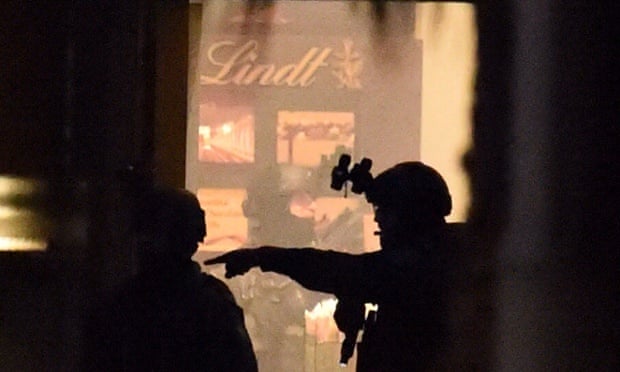The Sydney siege should not be used to justify draconian new anti-terrorism laws
Australia was not changed by the attack in Martin Place. But it may
be changed if these terrible events are used to defend new surveillance
laws and curbs on press freedom

Heavily armed police storm the Lindt Chocolate Cafe in Sydney’s Martin
Place on Tuesday morning, ending a siege which killed two hostages and
the gunman. Photograph: Mick Tsikas/AAP Image
This
will be used to justify so much: controversial security laws the Abbott
government has already passed, the metadata retention law waiting in
the wings and heaven knows what other laws may now be dreamed up in the
aftermath of the shocking deaths in the Lindt cafe.
Dealing with Man Haron Monis never needed fancy new security laws. He
has been on the radar of police – and probably Asio – since at least
October 2009 when he turned up at a police station in Sydney’s western
suburbs trying to report a bogus terrorist attack. He was charged,
instead, with writing menacing letters to the families of soldiers
killed in Afghanistan.
From
that point until yesterday’s terrible events, police and Asio had all
the authority they needed to keep track of a man who revealed himself
over the years to be really nasty and really crazy.
Old laws allowed police to bug his phones, intercept his emails and
place him under surveillance. They didn’t even need a warrant to access
his metadata and track down everywhere Monis had been and everyone he
was talking to year after year.
They didn’t need fresh laws threatening journalists with 10 years’
jail for revealing Asio’s newfangled “special” operations. Look at the
superb cooperation the press displayed during the siege: forgoing scoop
after scoop to follow the police strategy of denying Monis the oxygen of
publicity.
In the months ahead, with due acknowledgement for the skill they
showed in the siege, a failure of policing will have to be faced.
Despite having all the powers they needed at their disposal, and despite
Monis’s erratic behaviour over so many years, the Australian federal police, the NSW police and Asio weren’t able to prevent him putting into effect his crazy plan.
The cry will now go up for fresh powers. We’ll hear that old freedoms
have to be curtailed and traditional restraints ditched in the
interests of public security. There will be a clamour for grim
legislation.
If new laws are needed, let’s have new laws. But these demands by
politicians and police must be interrogated. And the questions that need
to be asked should be absolutely practical: what new powers would have
prevented that man from taking those hostages in Sydney on 15 December?
This
is not a time for blanket new anti-terrorism laws. More facts may yet
emerge, but Monis seems not to have been part of any terrorist
operation. He wasn’t under orders. The horrors in the Lindt cafe seem to
owe as much to Hollywood as terrorist manuals. All we know for certain
is that Monis was a terrorist in his own crazy imagination.
Had he lived he would now be facing trial for terrible crimes. No
gaps in the criminal law would have allowed him to escape punishment. No
new statutes would be needed to send a man who did what he did to
prison – almost certainly for the rest of his life. It’s all there.
Australia was not changed in the early hours of this morning. But it
may be changed if these terrible events in Sydney are used to drive
another agenda altogether: the criminalisation of the press and the
needless extension of surveillance into the lives of all of us all in
the name of fighting terrorism.
will be used to justify so much: controversial security laws the Abbott
government has already passed, the metadata retention law waiting in
the wings and heaven knows what other laws may now be dreamed up in the
aftermath of the shocking deaths in the Lindt cafe.
Dealing with Man Haron Monis never needed fancy new security laws. He
has been on the radar of police – and probably Asio – since at least
October 2009 when he turned up at a police station in Sydney’s western
suburbs trying to report a bogus terrorist attack. He was charged,
instead, with writing menacing letters to the families of soldiers
killed in Afghanistan.
From
that point until yesterday’s terrible events, police and Asio had all
the authority they needed to keep track of a man who revealed himself
over the years to be really nasty and really crazy.
Old laws allowed police to bug his phones, intercept his emails and
place him under surveillance. They didn’t even need a warrant to access
his metadata and track down everywhere Monis had been and everyone he
was talking to year after year.
They didn’t need fresh laws threatening journalists with 10 years’
jail for revealing Asio’s newfangled “special” operations. Look at the
superb cooperation the press displayed during the siege: forgoing scoop
after scoop to follow the police strategy of denying Monis the oxygen of
publicity.
In the months ahead, with due acknowledgement for the skill they
showed in the siege, a failure of policing will have to be faced.
Despite having all the powers they needed at their disposal, and despite
Monis’s erratic behaviour over so many years, the Australian federal police, the NSW police and Asio weren’t able to prevent him putting into effect his crazy plan.
The cry will now go up for fresh powers. We’ll hear that old freedoms
have to be curtailed and traditional restraints ditched in the
interests of public security. There will be a clamour for grim
legislation.
If new laws are needed, let’s have new laws. But these demands by
politicians and police must be interrogated. And the questions that need
to be asked should be absolutely practical: what new powers would have
prevented that man from taking those hostages in Sydney on 15 December?
This
is not a time for blanket new anti-terrorism laws. More facts may yet
emerge, but Monis seems not to have been part of any terrorist
operation. He wasn’t under orders. The horrors in the Lindt cafe seem to
owe as much to Hollywood as terrorist manuals. All we know for certain
is that Monis was a terrorist in his own crazy imagination.
Had he lived he would now be facing trial for terrible crimes. No
gaps in the criminal law would have allowed him to escape punishment. No
new statutes would be needed to send a man who did what he did to
prison – almost certainly for the rest of his life. It’s all there.
Australia was not changed in the early hours of this morning. But it
may be changed if these terrible events in Sydney are used to drive
another agenda altogether: the criminalisation of the press and the
needless extension of surveillance into the lives of all of us all in
the name of fighting terrorism.


No comments:
Post a Comment